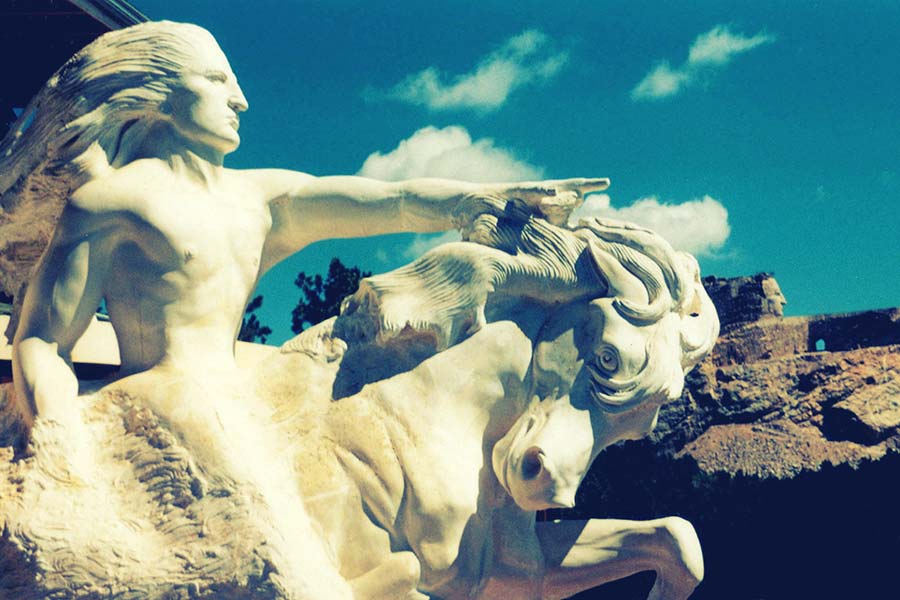Crazy Horse was one of the Native American warriors who defeated Lieutenant Colonel George Custer at the Battle of Little Bighorn in Montana in 1876. He was famous for his extreme bravery, quiet humility, and strong dedication.
One Arapaho warrior, Water Man, who fought with Crazy Horse, characterized him as “the bravest man I ever saw.” Crazy Horse would ride closest to Custer’s soldiers all the while encouraging his warriors. He would shout, “Hoya –hay. This is a good day to die!” “All the soldiers were shooting at him,” said Water Man, “but he was never hit.” He was a warrior-leader unleashed!
The obvious goal of all effective leaders is the pursuit of excellence. But, it is more than the quest for the kind of achievement that resides at the far end of the yardstick. It is the strong expression of wholeness. Leaders who are unleashed are “suns” of distinction, not “moons” of accomplishment—they do not reflect but rather radiate energetic joy. Their infectious heartiness touches, influences, and gives courage to all around them. Crazy Horse did more than simply show off personal bravery; he unearthed like-minded daring in his fellow warriors.
What is leadership unleashed? If we dissected its elements, what features might we find? And, what are the lessons for leaders eager to find, nurture and sustain such extraordinary performance and its desired impact?
Being Self, Not Watching Self
A little-known story about Crazy Horse came from Chief Rain-in-the-Face from the Hunkpapa tribe of the great Sioux nation. In the book The Custer Myth by historian W. A. Graham he reports that some Indian braves went into battle only after consuming drugs, alcohol or both. Rain-in-the-Face claimed Crazy Horse never needed such help to be brave. He wanted to remain totally in the moment high only on his pledge to prevail.
Leadership unleashed is a genuine expression honed from a strong sense of self. It is unabashedly being who we really are in front of others. Unshackled by a fear of rejection, we are released to go further, soar higher, and keep going longer. Realness is boldness unclothed and without remorse.
Memo to Leaders: Examine leadership practices that directly or subtly erode the self-esteem of your associates. Avoid using guilt as a tool for influence. Communicate a compelling purpose. Encourage and affirm initiative. Remember the words of writer Tex Bender: “You can pretend to care, but you cannot pretend to be there.” Be present in the lives of associates, not just in their toil.
Open, Not Closed
Crazy Horse was shy as a young man. Author John Neihardt described Crazy Horse in his book Black Elk Speaks as a person of great modesty and reserve but who was generous to the poor, the elderly, and children. “Everybody liked him,” wrote Neihardt, “and would do anything he wanted or go anywhere he said.”
Leadership unleashed carries the trait of trustworthiness because it is borne of openness and vulnerability. We trust people who are transparent and forthright. It is the trait of people willing to pioneer and experiment. They carry a personal vision of excellence, even when there is no plan for success. They boldly take initiative, not out of duty or response to a command, but from a strong sense of purpose.
Memo to Leaders: Encourage associates to set goals and objectives high. As Norman Vincent Peale wrote, “Shoot for the moon. Even if you miss, you’ll wind up among the stars.” Be a champion of greatness. Never tolerate mediocrity…in yourself, in others, in anything…ever. Share stories of greatness and invite examples of excellence from others. Speak in possibilities not in restrictions.
Inclusive, Not Exclusive
There is a back-story to Crazy Horse’s battlefield gallantry. After a violent, controversial incident in his village, he ventured alone to seek spiritual guidance on how to cope with the incident. He had a dream in which a warrior came out of a lake and floated above him. The warrior told Crazy Horse that if he dressed modestly and never took scalps or war trophies, he would never be harmed in battle. Crazy Horse’s father, Waglula, interpreted the dream as a plea for compassion.
The story provides a metaphor to characterize a feature of leadership unleashed. As practitioners of empathy and compassion, it unleashes associates to become magnets for bringing out the best in others around them. They are the people with an optimistic spirit of greatness others want to emulate.
Memo to Leaders: Be famous for your kindness and compassion. Never allow associates to use hurtful sarcasm or show disrespect of others, regardless of their intent. Pursue optimism. Let your unit become a haven for contrary views and a hangout for people with progressive attitudes. Listen to learn, not to correct or make a point. Seek to find the echo of you in your associates. Be a forceful spirit for the remarkable.
Celebrate and Support
Leadership unleashed is a demonstration of confidence with every ounce of timidity or reserve removed. It is found among people who tell their doubts, reservations, cautions, and reserve to be a spectator in the cheap seats and not a noisy coach on the sideline. Such unleashed leadership yields results that are more than over-the-top; they are awe-inspiring.
It is as rare today as it vital to organizational growth and success. And, it comes from the influence of leaders who reframe their partnership with their performers to be their guide, not their shepherd; a supporter, not a commander, and an ardent champion of removing any hint of fear in the workplace. It is a fundamentally a celebration of bravery.
Author Chris Hedges, writing for the website Truthdig.com, had this to say about Crazy Horse: “There are few resistance figures in American history as noble as Crazy Horse. His ferocity of spirit remains a guiding light for all who seek lives of defiance.” Whether the defiance is against the “domestication” of Native Americans or the “denudification” of mediocrity, leadership unleashed is the personification of the Crazy Horse spirit.




































